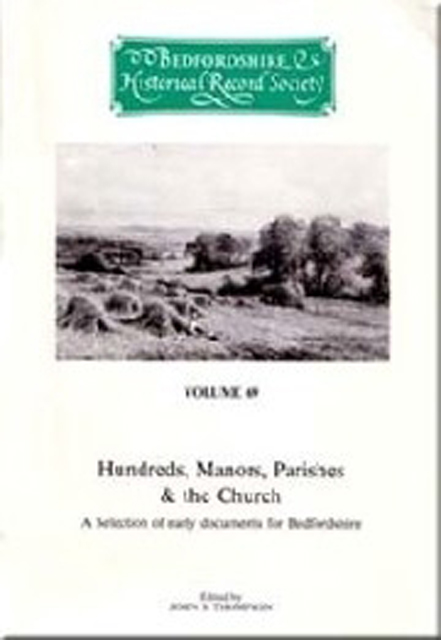Book contents
- Frontmatter
- Contents
- Abbreviations
- Symbols Used In Transcription
- Preface: John Stevenson Thompson
- The Hundred Rolls of 1274 And 1279
- Account Roll For Higham Gobion And Streatley 1379-1382
- Blunham Rectory Accounts 1520-1539
- Turvey Churchwardens' Accounts 1551-1552
- Bedfordshire Archidiaconal Visitations 1578
- Eggington Manor Court Rolls 1297-1572
- Index of personal names
- Index of places
Preface: John Stevenson Thompson
Published online by Cambridge University Press: 05 August 2023
- Frontmatter
- Contents
- Abbreviations
- Symbols Used In Transcription
- Preface: John Stevenson Thompson
- The Hundred Rolls of 1274 And 1279
- Account Roll For Higham Gobion And Streatley 1379-1382
- Blunham Rectory Accounts 1520-1539
- Turvey Churchwardens' Accounts 1551-1552
- Bedfordshire Archidiaconal Visitations 1578
- Eggington Manor Court Rolls 1297-1572
- Index of personal names
- Index of places
Summary
Most record offices profit from the work of volunteers, who come regularly to work on aids for readers which the staff would never have the time to provide. Some volunteers work on indexing newspapers, or transcribe from microfilm and then index the nineteenth century census returns. However, those who have Latin and enjoy a challenge, turn to transcribing and translating medieval manor court and account rolls and rentals, for very few readers at a local record office today could attempt to deal with the originals. Staff always try to help a researcher with a particular problem, but they will never have the time to translate the whole of a long document into English. The Bedfordshire County Record Office has been very fortunate in that since 1969 John S. Thompson has been coming in regularly two mornings a week, when free to do so, and has translated many medieval documents from the original Latin, and has also transcribed and typed out sixteenth and seventeenth century material written in English, where the hand is too difficult for the ordinary reader.
For some years before retirement gave John the time to use in this way, Isobel, his wife, had been coming to the Record Office with equal regularity, fitting her work there into a day that included running a house and caring for two children; part-time teaching; indexing and secretarial work; and (latterly) teaching in the children’s ward of the local hospital. Her illness and death meant that since 1985 John has come alone.
Both John and Isobel were at Cambridge, John at Clare College where he gained a first in engineering, and Isobel at Newnham where she read French and history, though they first met later at Newcastle. John’s career was in aeronautical research, first at Farnborough, and then at the RAE establishment at Thurleigh, which brought the family to live in Bedford. John has a mind that delights in solving puzzles — he was faithful to The Listener crossword for many years, not only solving but setting them — and his interest fails if a problem is too simple. However, with Latin learnt at Harrow, an old Kennedy’s grammar, the Medieval Latin Word List, and occasionally a magnifying glass, he passed many happy mornings teasing out the meaning of some much-rubbed court or account roll.
- Type
- Chapter
- Information
- Hundreds, Manors, Parishes and the ChurchA Selection of Early Documents for Bedfordshire, pp. 1 - 2Publisher: Boydell & BrewerFirst published in: 2023

